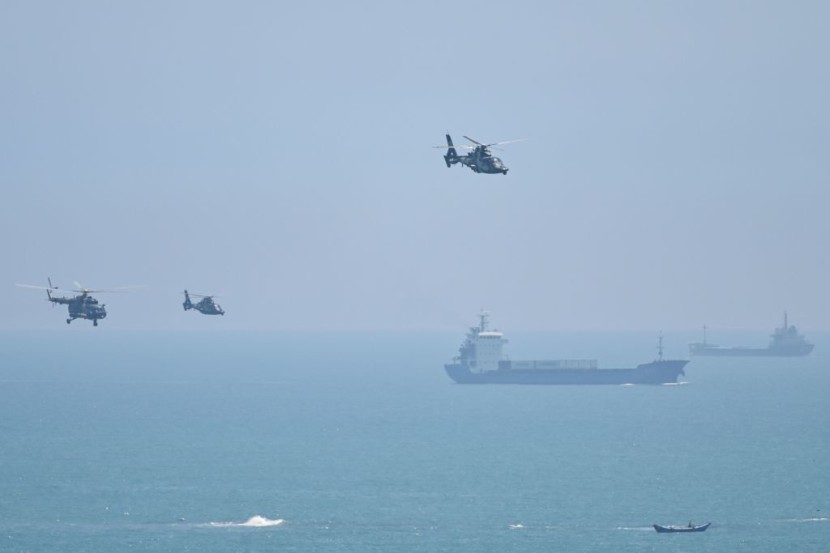
According to a prominent independent Washington think tank, a Chinese invasion of Taiwan in 2026 would result in thousands of casualties among Chinese, United States, Taiwanese, and Japanese forces, and would be unlikely to result in a Beijing victory.
The think tank conducted war game simulations of a potential conflict that is worrying military and political leaders in Asia and Washington.
Report: US Will Defeat China in War Over Taiwan
A conflict over Taiwan may put a successful US military in the same state of impairment as the Chinese ones it destroyed. At the conclusion of the fight, at least two US aircraft carriers would be submerged in the Pacific Ocean, and China's modern fleet, the greatest in the world, would be in "shambles."
The Center for Strategic and International Studies (CSIS) came to these conclusions after conducting what it claims is one of the most extensive war-game simulations ever conducted on a potential conflict over Taiwan, the democratically ruled island of 24 million people that the Chinese Communist Party claims as part of its sovereign territory despite having never controlled it.
Xi Jinping, the leader of China, has refused to rule out the use of military action to gain control of the island. J-10 fighter planes from the Chinese air force's August 1 Aerobatic Team perform during the 2022 Airshow in Zhuhai, Guangdong province, on November 10, 2022. Per CNN, China conducts military drills close to Taiwan and Japan, dispatching 47 aircraft across the Taiwan Strait as part of a "strike drill."
With Chinese President Xi Jinping describing the retaking of Taiwan as a "core interest" of his administration, the 165-page research argues that a confrontation between the United States and China over Taiwan remains "the most hazardous potential flashpoint in bilateral relations."
Secretary of State Antony Blinken cautioned several months ago that China seemed to be accelerating its timeline for action against Taiwan, which Beijing views as a renegade province despite the island's more than seventy-year-old independence.
Additionally, US military chiefs have cautioned that a Chinese military assault against Taiwan might occur before the decade's conclusion. Adm. Philip S. Davidson, who resigned in April 2021 as chief of the US Indo-Pacific Command, warned Congress that a Chinese invasion of Taiwan was probable within the next six years.
Frequently, the US military conducts simulated war scenarios against China. The outcomes of the exercises are kept secret to prevent China from learning about US military vulnerabilities and shortcomings, although experts and game organizers have stated in the past that China is frequently triumphant in simulated confrontations.
According to the CSIS study, the war games were performed and the findings were made public to stimulate discussion on the subject. The agency added that they attempted to use a broader lens to characterize the most probable international war.
The US policy toward Taiwan derives from the Taiwan Relations Act of 1979, which calls for aiding Taipei's defense but does not explicitly state that US military would intervene in a battle.
Since August, Chinese forces have intensified provocative military drills surrounding Taiwan, including missile firings that resembled an island conquest operation. A fleet of Chinese military planes entered Taiwan's protective airspace in the Taiwan Strait over the weekend, marking the latest violation of the long-respected borderline.
Read Also : Kim Jong Un Hints at North Korea Pro-longed Family Dynasty as Dictator Frequently Appears with Daughter
US Military Remains Focused
According to military observers, the United States military remains concentrated on Army troops required for the post-9/11 fight on terrorism, and not enough has been done to refocus the military on China's deterrence in the Pacific area.
To counter China's more assertive military, the United States must bolster naval and air power and restructure its troops, as per Washington Times. The research indicated that at least two US aircraft carriers would be left on the ocean floor of the Pacific after the fight, while the world's largest modern fleet, China's, would be in a dire position.
The objective of the think tank was to answer two fundamental questions: will the invasion be successful and at what cost? The likely responses to these two queries, according to the CSIS analysis, are "no" and "enormous."
In the majority of scenarios, two aircraft carriers and ten to twenty big surface combatants were lost by the United States Navy, according to Daily Mail. In three weeks of warfare, over 3,200 US troops would be killed, which is nearly half of the number of US forces killed in two decades of conflict in Iraq and Afghanistan.
Related Article : China Crash: 17 Killed, 22 Injured During Road Traffic Accident as the Country Opens Up Back Following Intense COVID-19 Chaos
@YouTube








